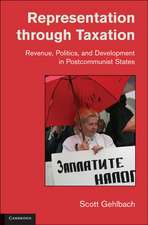Taxation and State-Building in Developing Countries: Capacity and Consent
Editat de Deborah Brautigam, Odd-Helge Fjeldstad, Mick Mooreen Limba Engleză Hardback – 9 ian 2008
| Toate formatele și edițiile | Preț | Express |
|---|---|---|
| Paperback (1) | 289.39 lei 6-8 săpt. | |
| Cambridge University Press – 9 ian 2008 | 289.39 lei 6-8 săpt. | |
| Hardback (1) | 557.68 lei 6-8 săpt. | |
| Cambridge University Press – 9 ian 2008 | 557.68 lei 6-8 săpt. |
Preț: 557.68 lei
Preț vechi: 626.60 lei
-11% Nou
Puncte Express: 837
Preț estimativ în valută:
106.74€ • 109.100$ • 90.11£
106.74€ • 109.100$ • 90.11£
Carte tipărită la comandă
Livrare economică 01-15 martie
Preluare comenzi: 021 569.72.76
Specificații
ISBN-13: 9780521888158
ISBN-10: 0521888158
Pagini: 308
Ilustrații: 15 tables
Dimensiuni: 152 x 229 x 21 mm
Greutate: 0.6 kg
Editura: Cambridge University Press
Colecția Cambridge University Press
Locul publicării:Cambridge, United Kingdom
ISBN-10: 0521888158
Pagini: 308
Ilustrații: 15 tables
Dimensiuni: 152 x 229 x 21 mm
Greutate: 0.6 kg
Editura: Cambridge University Press
Colecția Cambridge University Press
Locul publicării:Cambridge, United Kingdom
Cuprins
1. Introduction: taxation and state-building in developing countries Deborah Bräutigam; 2. Between coercion and contract: competing narratives on taxation and governance Mick Moore; 3. Capacity, consent and tax collection in post-communist states Gerald M. Easter; 4. Taxation and coercion in rural China Thomas P. Bernstein and Xiaobo Lü; 5. Mass taxation and state–society relations in East Africa Odd-Helge Fjeldstad and Ole Therkildsen; 6. Contingent capacity: export taxation and state-building in Mauritius Deborah Bräutigam; 7. Tax bargaining and nitrate exports: Chile 1880-1930 Carmenza Gallo; 8. Associational taxation: a pathway into the informal sector? Anuradha Joshi and Joseph Ayee; 9. Rethinking institutional capacity and tax regimes: the case of the sino-foreign salt inspectorate in republican China Julia Strauss; 10. Tax reform and state-building in a globalised world Odd-Helge Fjeldstad and Mick Moore.
Recenzii
'This book does a masterful job of clarifying the centrality of taxation as a means to build both states and societies. Its analytic contribution is significant. It also offers an excellent set of case studies that demonstrate how government can improve revenue raising while also promoting the general welfare of the polity. The neat combination of theory and cases ensures that this exciting collective endeavor will shape both scholarship and policy-making for years to come.' Margaret Levi, University of Washington
'The news is in: how much and how states tax their populations makes a tremendous difference to how well those populations live. And more taxes can actually coincide with better lives. In a series of well crafted studies, Brautigam, Moore and Fjeldstad show exactly how taxation - from coercive to contractual - makes a difference to national well being.' Charles Tilly, Columbia University
'Ranging across continents and political regimes, Brautigam, Fjeldstad, Moore and their colleagues provide lucid, dispassionate analysis of one of the most crucial issues in the contemporary political economy of development. Taxes are the cornerstone of any modern society, but for poor countries the capacity to tax can be the difference between chaos and development. This book skillfully dissects the ways in which global models have failed to serve the interests of poor countries and provides careful suggestions as to what actually works. Policy-makers and scholars alike should be grateful to have such a well-crafted, finely-balanced contribution to a topic too often mired in polemic and ideology.' Peter Evans, University of California, Berkeley
'The news is in: how much and how states tax their populations makes a tremendous difference to how well those populations live. And more taxes can actually coincide with better lives. In a series of well crafted studies, Brautigam, Moore and Fjeldstad show exactly how taxation - from coercive to contractual - makes a difference to national well being.' Charles Tilly, Columbia University
'Ranging across continents and political regimes, Brautigam, Fjeldstad, Moore and their colleagues provide lucid, dispassionate analysis of one of the most crucial issues in the contemporary political economy of development. Taxes are the cornerstone of any modern society, but for poor countries the capacity to tax can be the difference between chaos and development. This book skillfully dissects the ways in which global models have failed to serve the interests of poor countries and provides careful suggestions as to what actually works. Policy-makers and scholars alike should be grateful to have such a well-crafted, finely-balanced contribution to a topic too often mired in polemic and ideology.' Peter Evans, University of California, Berkeley
Descriere
Explains why taxation is a vital topic in explaining weak government in the poorer world.








